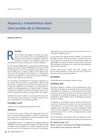 6 citations,
June 2016 in “Experimental Dermatology”
6 citations,
June 2016 in “Experimental Dermatology” Frontal Fibrosing Alopecia is a poorly understood condition that is hard to treat and causes distressing hair loss.
Androgen receptor degrader drugs may be a promising future treatment for hair loss.
 180 citations,
September 1999 in “British Journal of Dermatology”
180 citations,
September 1999 in “British Journal of Dermatology” Hair loss affects self-esteem and quality of life; treatments can help.
 30 citations,
September 2016 in “BMJ”
30 citations,
September 2016 in “BMJ” Taking 5-α reductase inhibitors for prostate enlargement or hair loss does not significantly raise the risk of erectile dysfunction.
 4 citations,
October 2015 in “Journal of Evaluation in Clinical Practice”
4 citations,
October 2015 in “Journal of Evaluation in Clinical Practice” European guideline best for treating hair loss; involve stakeholders and patients for improvement.
January 2008 in “Journal of Practical Dermatology”  January 2019 in “Our Dermatology Online”
January 2019 in “Our Dermatology Online” Almost 40% of older men in the study had hair loss on the front and side of their legs, and most were unaware of it.
 2 citations,
April 2017 in “European Urology”
2 citations,
April 2017 in “European Urology” Using finasteride for hair loss or prostate issues does not significantly raise the risk of erectile dysfunction.
 March 2023 in “Journal of clinical review & case reports”
March 2023 in “Journal of clinical review & case reports” Frontal Fibrosing Alopecia mainly affects postmenopausal Mexican women, requiring early detection to prevent permanent hair loss.
40 citations,
October 2012 in “Dermatologic clinics” More research is needed to understand the genetic causes of Alopecia areata to develop better treatments.
 34 citations,
February 2012 in “Journal of Cutaneous Pathology”
34 citations,
February 2012 in “Journal of Cutaneous Pathology” The research found specific signs to diagnose alopecia areata incognito and noted patients generally regrow hair after steroid treatment.
 21 citations,
June 2017 in “Journal of The American Academy of Dermatology”
21 citations,
June 2017 in “Journal of The American Academy of Dermatology” Topical DPCP is somewhat effective for hair loss in alopecia areata, but more research is needed.
 20 citations,
June 2019 in “Experimental Dermatology”
20 citations,
June 2019 in “Experimental Dermatology” The research suggests that autophagy-related genes might play a role in causing alopecia areata.
6 citations,
July 2013 in “JAMA dermatology” The research explored how children in school view peers with alopecia areata.
 April 2024 in “Medical & clinical research”
April 2024 in “Medical & clinical research” More research is needed to find the best long-term treatments for Alopecia Areata.
 January 2024 in “Biomedical journal of scientific & technical research”
January 2024 in “Biomedical journal of scientific & technical research” CRISPR/Cas9 gene-editing may effectively treat hair loss but requires more research for safe use.
 January 2024 in “Skin Research and Technology”
January 2024 in “Skin Research and Technology” Oral tofacitinib may be an effective future treatment for children with severe alopecia areata, but more research is needed.
 April 2023 in “The journal of investigative dermatology/Journal of investigative dermatology”
April 2023 in “The journal of investigative dermatology/Journal of investigative dermatology” The research identified unique metabolic activities in immune cells associated with hair loss in Alopecia Areata.
 April 2023 in “Medizinische Genetik”
April 2023 in “Medizinische Genetik” New research has found 14 genes linked to the risk of developing alopecia areata, improving understanding and treatment options.
 April 2019 in “Journal of Investigative Dermatology”
April 2019 in “Journal of Investigative Dermatology” The research found that certain characteristics like age, sex, race, marital status, and education level can influence whether alopecia patients stick to their hair loss treatment with topical minoxidil.
 September 2012 in “Medicina estética/Medicina estética”
September 2012 in “Medicina estética/Medicina estética” More research is needed to confirm if laser therapy effectively treats hair loss.
 April 2023 in “Journal of Investigative Dermatology”
April 2023 in “Journal of Investigative Dermatology” The research developed methods to test drugs that could protect and restore hair follicle protection in a hair loss condition.
 June 2020 in “Medicina estética”
June 2020 in “Medicina estética” More research is needed to find effective treatments for Female Pattern Hair Loss.
 25 citations,
August 2014 in “Endocrinology”
25 citations,
August 2014 in “Endocrinology” Researchers created a mouse model of a type of rickets that does not cause hair loss.
 20 citations,
December 2017 in “Journal of Investigative Dermatology Symposium Proceedings”
20 citations,
December 2017 in “Journal of Investigative Dermatology Symposium Proceedings” Researchers created a fast, accurate computer program to measure hair loss in alopecia areata patients.
 15 citations,
February 2014 in “BMC Research Notes”
15 citations,
February 2014 in “BMC Research Notes” The X5 Hairlaser might help treat male hair loss, but more research is needed.
15 citations,
October 1996 in “Archives of Dermatology” Researchers identified a new hair loss pattern called "sisaipho type," where hair is lost across the scalp except around the edges.
 11 citations,
March 2021 in “Dermatology and therapy”
11 citations,
March 2021 in “Dermatology and therapy” Researchers created a new tool to measure the effects of alopecia areata from the patient's view, focusing on hair loss, daily life, and emotional health.
 10 citations,
September 2020 in “Computational and Mathematical Methods in Medicine”
10 citations,
September 2020 in “Computational and Mathematical Methods in Medicine” Researchers developed an algorithm for self-diagnosing scalp conditions with high accuracy using smart device-attached microscopes.























